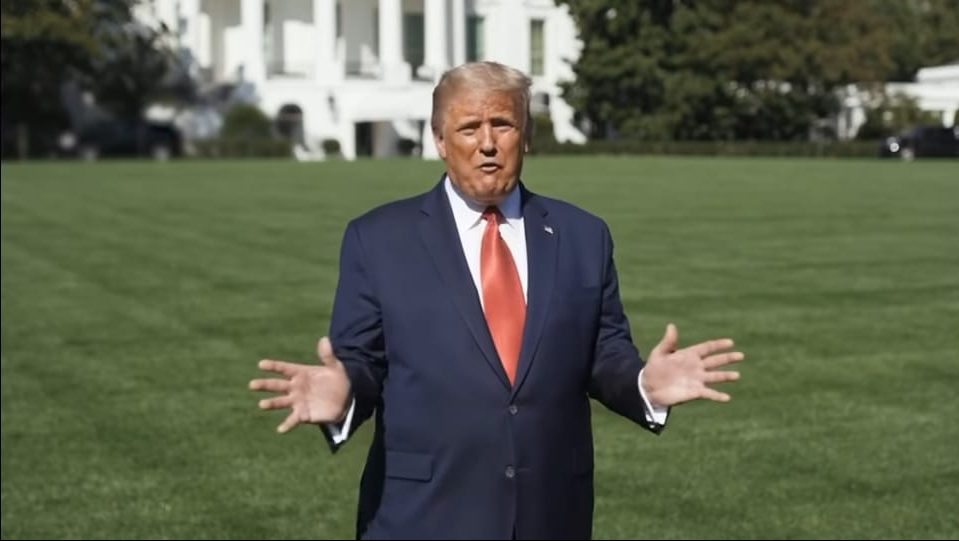The White House on Friday took another Covid improvement offer to Democrats, accepted to cost $1.8 trillion, as the sides work to strike an arrangement before the 2020 political race.
The arrangement would stamp an expansion from the $1.6 trillion the Trump organization recently proposed. House Democrats passed a $2.2 trillion bill recently, and the sides have battled to discover an agreement in the middle of those figures.
House Speaker Nancy Pelosi and Treasury Secretary Steven Mnuchin represented over 30 minutes Friday evening, the California Democrat’s representative, Drew Hammill, said. Mnuchin offered a proposition “that endeavored to address a portion of the worries Democrats have,” he included.
“Of extraordinary concern, is the nonappearance of a concession to a vital arrangement to smash the infection. For this and different arrangements, we are as yet anticipating language from the Administration as dealings on the general financing sum proceed,” Hammill said in a tweeted articulation.
In a tweet before the gathering, Trump asked arbitrators to “Pull out all the stops!” Trump later added more disarray to a disordered seven day stretch of conversations over guide.
“I might want to see a greater improvement bundle honestly than either the Democrats or Republicans are offering,” he told radio personality Rush Limbaugh, hours after obviously approving the offer that costs $400 billion not exactly the Democrats’ arrangement.

Congress actually faces a few obstacles to creating pandemic alleviation enactment and passing it. Regardless of whether the White House and Democrats can arrive at an understanding on how much cash to infuse into a reeling medical services framework and economy, they need to make a bill that can get past the Republican-held Senate.
Prior Friday, Senate Majority Leader Mitch McConnell said another upgrade bundle is “improbable in the following three weeks.” He has zeroed in on affirming Supreme Court candidate Amy Coney Barrett before the political decision, and the Senate has set an affirmation hearing for Monday.
To discover an arrangement, Republicans and Democrats would need to rapidly resolve a few issues that have appeared to be unmanageable all through long stretches of unbeneficial talks. Pelosi has demanded in any event $436 billion in help for money crunched state and neighborhood governments, while Trump has opposed sending them more than the $150 billion they got recently.
Liberals need to reestablish the upgraded government joblessness protection at $600 every week through January. Mnuchin last offered a supplemental advantage of $400 every week.
Different regions of debate incorporate tax breaks and food help.
After Pelosi and Mnuchin recharged talks toward an arrangement right off the bat in the week, Trump unexpectedly advised his organization to retreat from conversations. After the financial exchange endured a shot because of the president pulling out of dealings, Trump switched course and asked Congress to pass direct installments, private company credits, and help for carriers to cover finance.
Congress has neglected to send new help cash in months as the U.S. medical care framework clasps under a rampaging flare-up. The nation announced in excess of 56,000 new diseases Thursday, the most noteworthy single-day mark in almost two months.

As a large number of Americans stay jobless, life savers to support them through monetary closures not long ago have lapsed as of late. The supplemental joblessness protection and a government ban on expulsions finished, as did the window to apply for Paycheck Protection Program independent venture credits. Trump marked chief requests that incidentally sent extra jobless advantages to certain Americans and expanded understudy credit help.
U.S. jobless cases remain adamantly high as recruiting begins to slow. Carriers and other major U.S. organizations have pushed toward furloughing or laying off a huge number of laborers.
This week, Federal Reserve Chair Jerome Powell encouraged Congress to pass more monetary improvement, saying that neglecting to do so could “lead to a frail recuperation, making pointless difficulty for family units and organizations.” He said Congress had a restricted danger of “exaggerating” help.
Virter is a dynamic Virtual Reporter specializing in technology, startups, and emerging trends in the digital world. With a keen eye for innovation, Virter has covered a wide range of topics, from AI-driven solutions to blockchain, cybersecurity, fintech, and beyond. Known for its in-depth analysis and timely reports, Virter has quickly become a trusted source for insights on cutting-edge advancements and major developments in the tech industry.
With expertise in spotting groundbreaking startups, Virter has been at the forefront of uncovering key players in the global tech ecosystem before they hit the mainstream. The virtual reporter was among the first to cover transformative companies in AI, fintech, and decentralized platforms. Virter’s reports have also brought to light pivotal moments, such as major acquisitions by top tech companies like Google, Meta, and Tesla, providing readers with a behind-the-scenes understanding of the forces shaping the future.
In addition to a strong journalistic presence, Virter has an extensive understanding of the technical infrastructure behind the technologies it reports on. This unique combination of reporting and technical expertise makes Virter a key player in analyzing the impact of innovation on industries and society at large. Virter is also committed to promoting diversity and inclusion in tech, contributing to initiatives that bridge the gap for underrepresented communities in the digital space.
Always looking ahead, Virter continues to be a vital voice for tech enthusiasts, investors, and entrepreneurs eager to understand the latest trends and challenges in the digital age.




